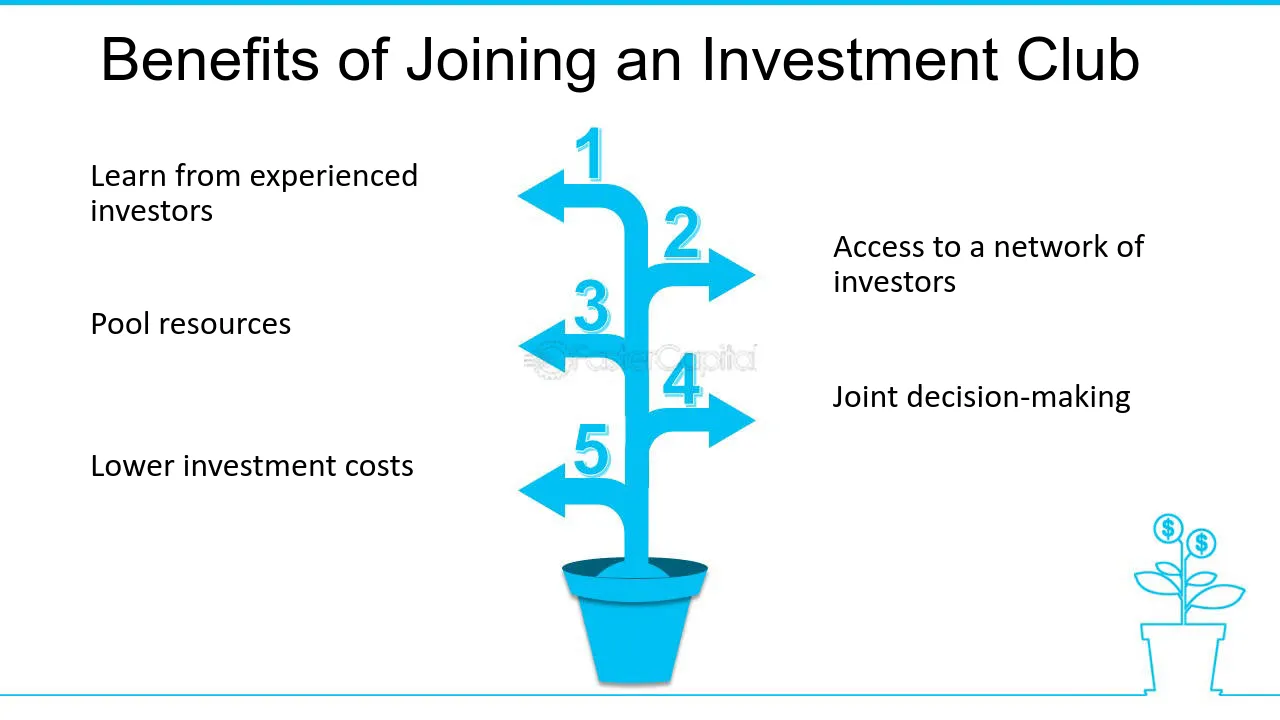Investment Club: Definition, Advantages, How To Start One
An investment club is a group of individuals who pool their money together to make investments in various financial instruments such as stocks, bonds, and mutual funds. The main purpose of an investment club is to provide its members with an opportunity to learn about investing, share investment ideas, and collectively make investment decisions.
Advantages of an Investment Club
- Shared Knowledge and Expertise: By joining an investment club, members can benefit from the collective knowledge and expertise of the group. They can learn from more experienced investors and gain insights into different investment strategies.
- Diversification: Pooling money together allows the investment club to diversify its portfolio. By investing in a variety of assets, the club can reduce the overall risk and increase the potential for returns.
- Lower Costs: By investing as a group, the investment club can negotiate lower fees and commissions with brokers and other service providers. This can result in cost savings for the members.
- Emotional Support: Investing can be a stressful and emotional endeavor. Being part of an investment club provides emotional support as members can share their successes, failures, and concerns with like-minded individuals.
- Education and Learning: Investment clubs often organize educational activities such as guest speakers, workshops, and seminars. These activities help members enhance their investment knowledge and skills.
How To Start an Investment Club
- Find Like-Minded Individuals: Start by finding individuals who are interested in investing and have a similar investment philosophy. You can reach out to friends, family, colleagues, or join online investment communities.
- Define Club Objectives and Rules: Discuss and agree on the club’s objectives, investment strategies, and rules. This includes deciding on the amount of money each member will contribute, the frequency of meetings, and the decision-making process.
- Set Up a Legal Structure: Consider setting up a legal structure for the investment club, such as a partnership or limited liability company (LLC). This will help protect the members’ personal assets and provide a framework for managing the club’s operations.
- Open a Club Account: Open a separate bank account for the investment club to manage its funds. This account should be used exclusively for club-related transactions.
- Research and Make Investments: Conduct thorough research and analysis before making investment decisions. The club members should collectively decide on the investments and monitor the performance of the portfolio regularly.
- Maintain Records and Communication: Keep detailed records of all club activities, including contributions, investments, and returns. Regularly communicate with club members to share updates and discuss investment ideas.
Starting an investment club can be a rewarding experience that allows individuals to learn about investing, build wealth, and form lasting relationships with like-minded individuals. By following these steps and working together, members can create a successful investment club.
Definition of an Investment Club

An investment club is a group of individuals who pool their money together to invest in various financial assets such as stocks, bonds, and mutual funds. The club is typically formed with a specific investment objective or strategy in mind.
Members of an investment club contribute a certain amount of money on a regular basis, usually monthly or quarterly. The pooled funds are then used to make investment decisions, which are voted on by the members. This collective decision-making process allows for a diversified portfolio and reduces the risk associated with individual investment decisions.
Investment clubs are often formed by friends, family members, or colleagues who have a common interest in investing and want to learn more about the financial markets. By pooling their resources and knowledge, members can benefit from shared research, analysis, and investment strategies.
One of the key benefits of an investment club is the opportunity to learn about investing in a supportive and collaborative environment. Members can share their experiences, ask questions, and gain valuable insights from others who may have more experience or expertise in certain areas.
Additionally, investment clubs provide a platform for individuals to start investing with a smaller amount of money. By pooling their resources, members can access investment opportunities that may not be available to them individually. This can help to diversify their portfolios and potentially increase their returns.
In summary, an investment club is a group of individuals who come together to pool their money and make collective investment decisions. It offers a supportive and collaborative environment for learning about investing and provides access to investment opportunities that may not be available to individuals. Joining an investment club can be a great way to start investing and build wealth over time.
Advantages of an Investment Club

An investment club offers several advantages that make it an attractive option for individuals interested in investing:
1. Diversification
One of the key advantages of an investment club is the ability to diversify investments. By pooling funds together, members can collectively invest in a wide range of assets such as stocks, bonds, mutual funds, and real estate. This diversification helps to spread the risk and potentially increase the overall return on investment.
2. Shared Knowledge and Expertise

Another advantage of an investment club is the opportunity to tap into the collective knowledge and expertise of its members. Each member brings their own unique insights, experiences, and research to the table, which can help in making informed investment decisions. This collaborative approach can enhance the overall investment strategy and improve the chances of success.
3. Lower Costs

Investment clubs often benefit from economies of scale, allowing members to access investments and services at lower costs. By pooling funds together, members can negotiate better brokerage fees, reduce transaction costs, and access investment opportunities that may not be available to individual investors. This can lead to higher returns and cost savings in the long run.
4. Education and Networking
Participating in an investment club provides a valuable educational experience for members. Through discussions, presentations, and research, members can learn about different investment strategies, financial markets, and investment analysis techniques. Additionally, investment clubs offer networking opportunities, allowing members to connect with like-minded individuals and professionals in the finance industry.

Emily Bibb simplifies finance through bestselling books and articles, bridging complex concepts for everyday understanding. Engaging audiences via social media, she shares insights for financial success. Active in seminars and philanthropy, Bibb aims to create a more financially informed society, driven by her passion for empowering others.
